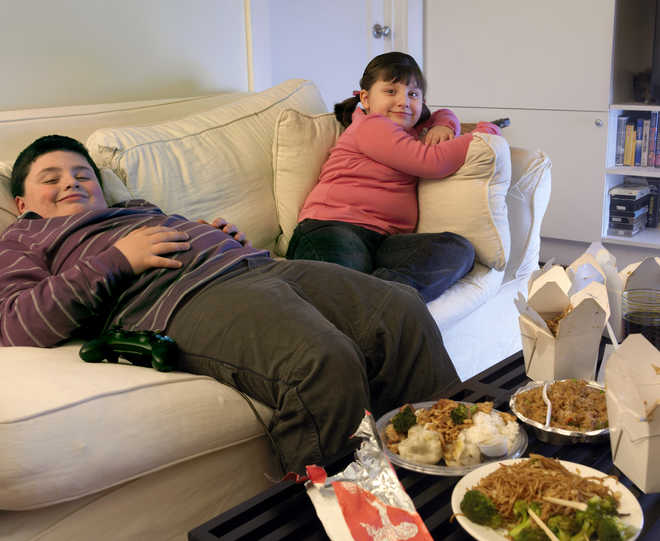
Dr Sachin Mittal
Obesity in children has increased exponentially over the last few decades. Recent studies from different parts of our country, including Punjab and Chandigarh, show that nearly 20 per cent of affluent urban children and adolescents are considered overweight or obese. Childhood obesity is associated with abnormal development and a subsequent increased risk of Type 2 diabetes mellitus, hypertension, heart disease, polycystic ovarian disease, breathing problems and gall stones.
What spurred the rise?
The increase has been fueled by the current environment of decreased physical activity and intake of calorie dense, often low in nutritive value foods. There has been a growing ‘fast food’ culture with a higher trend of eating out, bigger portion size and consumption of ready-to-eat packed foods.
A study conducted in Ludhiana showed that more than half of the adolescents ate meals outside home and a number of them replaced meals with snacks. No wonder then that international fast food brands are betting on India as their next growth driver. Marketing strategies typically target children to get them on these so-called snacks and carbonated beverages from a young age. Go to any supermarket store and candies and chocolates are always placed near the cash counters to increase the sale of this stuff — so called impulse purchases by the customers.
This coupled with a sedentary lifestyle and decreased physically activity make a potentially deadly cocktail. Modes of transportation have become better and better and, as a result, more and more drive rather than walk or cycle for not so long distances. Central Board of Secondary Education (CBSE) reported in 2007 that only 30 per cent of adolescents play for an hour or more. Typically kids spend more time watching TV, sitting in front of computer or playing video games rather than outdoor games.
Medical causes
In some cases, obesity can be due to various hormonal causes like thyroid abnormalities or steroid excess in the body or it can be due to some rare genetic or syndromic causes. In some cases, the clue to such a hormonal cause is when the weight increases, but height does not increase correspondingly. Often this is accompanied by pubertal problems making medical evaluation helpful.
The consequences
Obesity has a potential to derail a child’s normal development. Obese children are more often teased and bullied in school. They are less likely to participate actively and enthusiastically in social and extracurricular activities. Many of them have poor self-perception, especially with regard to their physical appearance and there is a higher chance of depression and development of low self-esteem in them. Obesity is associated with abnormalities of insulin and glucose metabolism and thus increased chances of developing Type 2 Diabetes Mellitus (T2DM).
In fact, exponential increase in childhood obesity is the predominant reason why T2DM, which has been mainly considered a disease of adults, is also seen in children now days. Obesity leads to increased chance of high blood pressure and high cholesterol levels, a trend increasingly seen even in obese adolescents today. This combination of factors is well known to increase risk of heart disease in later life.
Polycystic Ovarian Syndrome (PCOS), a hormonal disorder where there is a constellation of symptoms like irregular menses, acne, excess abnormal hair on face and body and higher chances of infertility later in life, is more commonly seen and is more severe in obese as compared to normal adolescents. Apart from these, obese children have higher chances of breathing difficulty due to asthma or sleep apnea, higher chances of gall stones, kidney diseases, pubertal problems and bone problems.
The writer is consultant endocrinologist at Fortis Hospital, Mohali
Battle the bulge
- Decrease consumption of sweetened carbonated beverages
- Limit watching of TV (0 hours < 2 years, < 2 hours >2 years old).
- Remove TV from primary sleeping area
- Eat breakfast daily
- Limit eating out and limit consumption of energy dense foods
- Do not replace snacks for meals
- Encourage family meals
- Limit portion size
- Eat a diet with balanced macronutrients, rich in calcium and high in fibre
- Promote moderate to vigorous activity for around 60 minutes a day



























